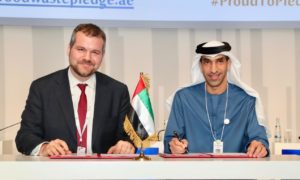UAE Hospitality Industry Saves 1.5 Million Meals From Going To Waste In 2018
In the presence of His Highness Sheikh Zayed bin Sultan bin Khalifa Al Nahyan, His Excellency Dr Thani bin Ahmed Al Zeyoudi, Minister of Climate Change and Environment, today announced that the UAE hospitality and food service sector saved 1.5 million meals from the bin in 2018 as part of the UAE food waste pledge. The announcement was made on the sidelines of Abu Dhabi Sustainability Week 2019.
The Ministry of Climate Change and Environment (MOCCAE) launched the initiative in May 2018 in partnership with Winnow, a UK-based startup that develops technology used by a growing number of organizations to eliminate food waste in their operations. The pledge challenged companies to save one million meals from going to waste in 2018, raising the target to two million in 2019 and three million in 2020.
The initiative supports the UAE’s commitment to halving food waste by 2030 in line with the global target to reduce food loss and waste by 50 percent by 2030 as per the United Nations Sustainable Development Goal 12: Responsible Production and Consumption.
Early adopters, including Majid Al Futtaim, Rotana Hotels & Resorts, Emaar, AccorHotels, A.A. Al Moosa Enterprises and ADNH Compass, were joined by 15 additional companies in October 2018. Collectively, they surpassed the set target and reduced their environmental footprint.
His Highness Sheikh Zayed bin Sultan bin Khalifa Al Nahyan said: “Alliances for Global Sustainability (AGS) understands the vital importance of sustainability for the preservation of our planet for future generations. We are committed to driving the green economy through our projects, initiatives and technologies that we develop locally, regionally and globally.”
He added: “On behalf of Her Highness Sheikha Shamma bint Sultan bin Khalifa Al Nahyan, CEO of AGS, I thank ADSW for the outstanding program this year.”
His Excellency Dr Al Zeyoudi said: “MOCCAE is working closely with local authorities and the private sector, as well as food waste solutions companies, such as Winnow, to minimize food waste throughout the production and consumption cycle, and to raise awareness about the adverse impact of food waste on the economy and the environment. In addition to the excessive expenditure incurred in putting surplus food on the table, the tons of wasted food tossed into landfills every year pose a grave threat to the health of our ecosystem.”
He added: “We encourage citizens and residents of the UAE to play their part through reducing the amount of food they waste and educating people around them to do the same. This will enable our next generations to enjoy a more prosperous future.”
His Excellency Dr Al Zeyoudi commended the UAE hospitality and food service sector for being one of the few in the world to take a decisive step and accept the challenge of reducing food waste in their kitchens.
Marc Zornes, co-founder and CEO of Winnow, said: “Tackling food waste is a no-brainer for hospitality businesses, as it allows them to save money while doing what is right for the environment. We are inspired by the results of the scheme so far and look forward to scaling up our impact through our partnership with the Ministry.”
According to data from over 450 sites in 25 countries that was collected by Winnow, restaurant kitchens generate waste that amounts to eight to 20 percent of total food costs. Food waste is the result of overproduction, kitchen errors, spoilage and damaged produce, and food left over on diners’ plates. In some facilities, the level of food waste can be as high as 40 percent. Often, this amount can equal or even surpass the total net profits of the restaurants.
To take the UAE food waste pledge to the next level, MOCCAE launched an online platform for the initiative. Businesses can sign up for this noble mission via www.foodwastepledge.ae.









 Email: info@cyber-gear.com
Email: info@cyber-gear.com